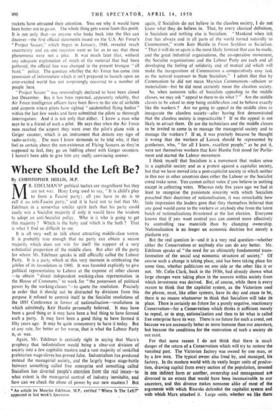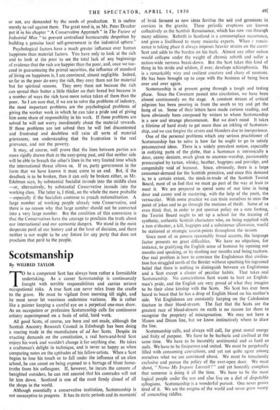Where Should the Left Be?
By CHRISTOPHER HOLLIS, M.P.
MR. EDELMAN'S* political tactics are magnificent but they are not war. Huey Long used to say, " It is child's play to form a Fascist party : all you have to do is to call it an anti-Fascist party," •and it is hard not to feel that Mr. Edelman in a somewhat similar spirit feels that his party could easily win a Socialist majority if only it would have the wisdom to adopt an anti-Socialist policy. Who is it who is going to get this majority ? Which is the baby and which is the bath ? That is what I find so difficult to see.
It is all very well to talk about attracting middle-class voters. It is probably true enough that no party can obtain a secure majority which does not win for itself the support of a very substantial proportion of the middle class. But after all the party for whom Mr. Edelman speaks is still officially called the Labour Party. It is a party which at this very moment is celebrating the jubilee of its foundation in 1900. It was founded explicitly to give political representation to Labour at the expense of other classes —to obtain " direct independent working-class representation in the House of Commons," to work for " the possession of political power by the working-classes "—to quote the resolution. Precisely in order that it should not be distracted by divisions from this purpose it refused to commit itself to the Socialist resolutions of the 1893 Conference in favour of nationalisation—resolutions in which admittedly Keir Hardie personally believed. It may have been a good thing or it may have been a bad thing to have formed such g party. It may have been a good thing to have formed it fifty years ago. It may be quite unnecessary to have it today. But at any rate, for better or for worse, that is what the Labour Party is, or was.
Again, Mr. Edelman is certainly right in saying that Marx's prophecy that industrialism would bring a clear-cut division of society into a few capitalist masters and a vast majority of unskilled proletarian wage-slaves has proved false. Industrialism has produced instead the managerial society, and the largely bogus stage-battle between something called free enterprise and something called Socialism has diverted people's attention from the real issues—to what extent is the managerial control of industry inevitable, and how can we check the abuse of power by our new masters ? . But
• An article by Maurice Edelman. M.P., entitled !' Where Is The Left?'
appeared in last week's Spectator. . again, if Socialists do not believe in the classless society, I do not know what they do believe in. That, by every classical definition, is Socialism and nothing else is Socialism. " Mankind when left free has always and in all parts of the world turned naturally to Communism," wrote Keir Hardie in From Serfdom to Socialism. "That it will do so again is the most likely forecast that can be made, and the great industrial organisations, the co-operative movement, the Socialist organisations and the Labour Party are each and all developing the feeling of solidarity and of mutual aid which will make the inauguration of Communism a comparatively easy task as the natural successor to State Socialism." I admit that that by Communism he did not mean Marxian Communism—atheism or materialism—but he did most certainly mean the classless society.
So, when someone talks of Socialists appealing to the middle classes, we may ask " appeal to them to do what ? " Are the middle classes to be asked to stop being middle-class and to behave exactly like the workers ? Are we going to appeal to the middle class to inaugurate the classless society—after having first demonstrated that the classless society is impracticable ? If so the appeal is not likely to attract them. Or are the technicians and the middle classes to be invited to come in to manage the managerial society and to manage the workers ? If so, it was precisely because he thought it wrong that the workers of Lanark should be represented by gentlemen, who, " for all I know, excellent people," as he put it, were not themselves workers that Keir Hardie first stood for Parlia- ment and started the Labour movement.
I think myself that Socialism is a movement that makes sense in a capitalist society and as a protest against a capitalist society, but that we have moved into a post-capitalist society in which neither in this nor in other countries does either the Labour or the Socialist creed make sense. You cannot collect votes if you believe in nothing except in collecting votes. Whereas only five years ago we had at least to recognise the passionate sincerity with which Socialists preached their doctrines of nationalisation, it was remarkable how little impression the leaders gave that they themselves believed that any good would come to the workers or anybody else from the latest batch of nationalisations threatened at the last election. Everyone knows that if you want control you can control more effectively by controlling raw materials than by changing ownership. Nationalisation is no longer an economic doctrine but merely a platform cry.
But the real question is—and it is a very real question—whether either the Conservatives or anybody else can do any better. Mr. Edelman speaks of " the need for an ultimately fundamental trans- formation of the social and economic structure . of society." Of course such a change is taking place, and has been taking place for some time, whether politicians on one side or the other like it or not. Mr. Colin Clark, back in the 1930s, had already shown what large changes were taking place in the sources within society from which investment was derived. But, of course, while there is every reason to think that the capitalist system, as the Victorians used the phrase, must, like other systems, have its day and cease to be, there is no reason whatsoever to think that Socialism will take its place. There is certainly no future for a purely negative, reactionary Conservatism—for a Conservatism which thinks it sufficient merely to repeal, or to atop, nationalisation and then to let what is called free enterprise have its way. There is no future for such a creed, not because we are necessarily better or more humane than our ancestors, but because the conditions for the restoration of such a society do not exist.
For that same ' reason I do not think that there is much danger of the return of a Conservatism which will try to restore the vanished past. The Victorian factory was owned by one man, or by a few men. The typical owner also lived by, and managed, his factory. In the modern world with its vastly larger units of produc- tion, drawing capital from every section of the population, invested in one indirect form or another, ownership and management are divorced to an extent that would have been inconceivable to our ancestors, and this divorce makes nonsense alike of most of the arguments with which Ricardo defended the capitalist. system and with which Marx attacked it. Large units, whether we like =them or not, are demanded by the needs of production. It is useless merely to rail against them. The great need is, as Mr. Peter Drucker put it in his chapter " A Conservative Approach " in The Future of Industrial Man " to -prevent centralised bureaucratic despotism by building a genuine local self-government in the industrial sphere."
Psychological factors have a much greater influence over human happiness than material factors. You have only to look at the rich and to look at the poor to see the total lack of any beginnings of evidence that the rich are happier than the'poor, and, once we suc- ceed in guaranteeing the primal securities, the influence of standard of living on happiness is, I am convinced, almost negligible. Indeed, so far as the poor do envy the rich, they envy them not for material but for spiritual reasons. They envy them not because the rich can spread their butter a little thicker on their bread but because in a number of ways the rich have more notice taken of them than the poor. So I am sure that, if we are to solve the problems of industry, the most important problems are the psychological problems of giving the worker work in which he can take a pride and of giving him some share of responsibility in his work. If those problems are solved he will not worry inordinately about the material rewards. If those problems are not solved then he will feel discontented and frustrated and doubtless will raise all sorts of material grievances, not understanding that the frustration is the real grievance, and not the poverty.
It may, of course, well prove that the lines between parties are more rigidly drawn thah in the easy-going past, and that neither side will be able to breach the other's lines in the very limited time which the international threat allows us. If so, party government in the form that we have known it must come to an end. But, if the deadlock is to be broken, then it can only be broken either, as Mr. Edelman says, by substantial Socialist inroads into the middle class —or, alternatively, by substantial Conservative inroads into the working class. The latter is, I think, on the whole the more probable —especially if the Socialists continue to preach nationalisation. A large number of working people already vote Conservative, and there is no reason why that large number should not be converted into a very large number. But the condition of this conversion is that the Conservatives have the courage to proclaim the truth about our international and our economic dangers. We stand in the most desperate peril of our history and at the hour of decision, and there neither is nor ought to be any future for any party that does not proclaim that peril to the people.







































 Previous page
Previous page